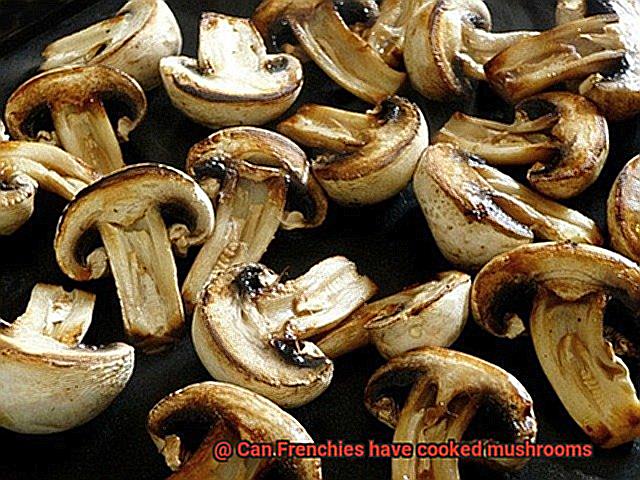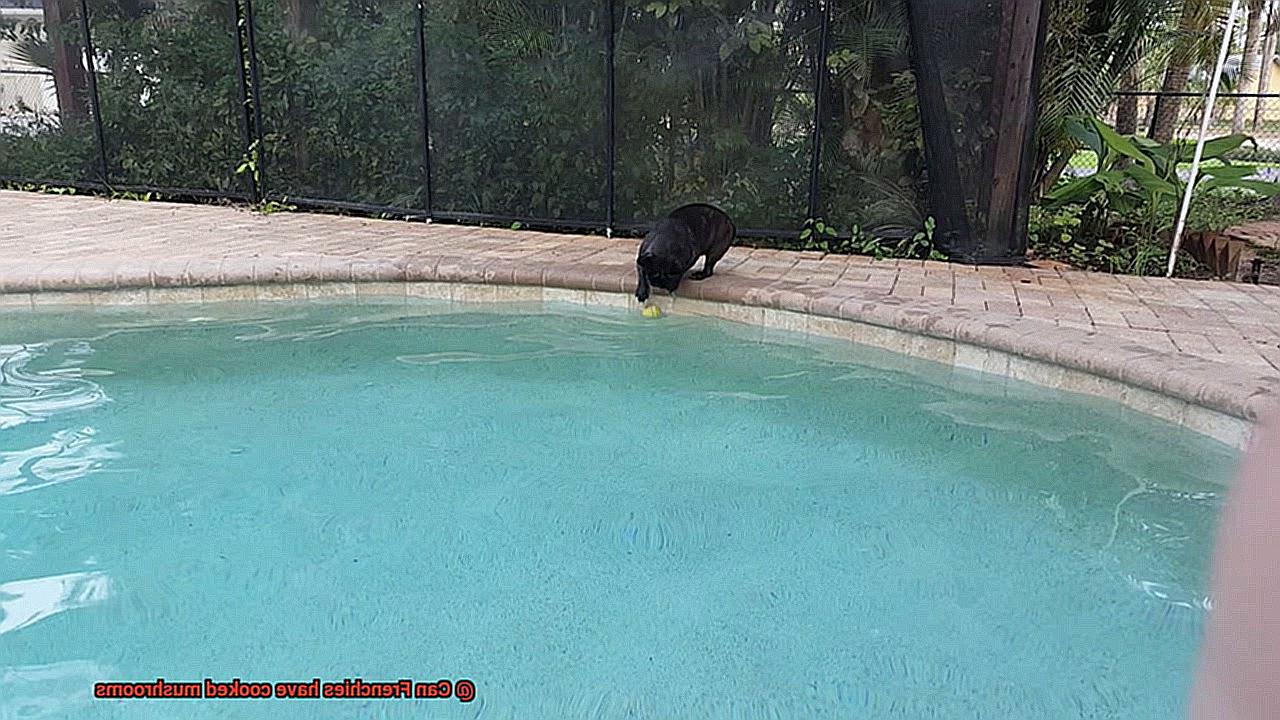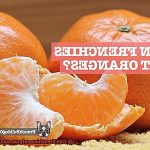Can Frenchies have cooked mushrooms?
If you’re like me, you adore your French Bulldog and want to make sure they’re well taken care of, even when it comes to their diet. That’s why today we’re tackling a burning question: can our adorable Frenchies savor the deliciousness of cooked mushrooms?
You know, those delectable fungi that add an earthy twist to so many mouthwatering dishes? While mushrooms may seem harmless to us humans, it’s crucial to understand how they might affect our furry friends.
So let’s embark on this culinary adventure together and discover if cooked mushrooms are a yay or nay for our furry pals.
What Types of Mushrooms Are Safe for French Bulldogs?
Contents
- 1 What Types of Mushrooms Are Safe for French Bulldogs?
- 1.1 Safe Mushroom Options:
- 1.2 b) Shiitake Mushrooms: With their meaty texture and rich flavor, shiitake mushrooms are a safe option for your furry friend. They are packed with vitamins and minerals that can benefit their overall health.
- 1.3 The Dangers of Toxic Mushrooms:
- 1.4 Moderation is Key:
- 1.5 Cooking Precautions:
- 1.6 Consult Your Veterinarian:
- 2 The Benefits of Adding Cooked Mushrooms to a Frenchie’s Diet
- 3 How to Prepare and Serve Cooked Mushrooms for French Bulldogs
- 4 Potential Risks of Feeding Cooked Mushrooms to French Bulldogs
- 5 Tips on Introducing New Foods Slowly and Carefully
- 6 Signs of Allergic Reactions or Intolerance in French Bulldogs
- 7 When to Seek Veterinary Advice About Feeding Cooked Mushrooms to Your Frenchie
- 8 Conclusion
French Bulldogs are beloved pets known for their sensitive stomachs. It is crucial to be cautious about the foods we feed them, including mushrooms. While some mushrooms are safe and even beneficial for French Bulldogs, others can be toxic and harmful to their health. In this article, we will explore which types of mushrooms are safe for French Bulldogs and provide important guidelines for feeding them.
Safe Mushroom Options:
- a) White Button Mushrooms: These low-calorie and low-fat mushrooms are commonly found in grocery stores. They can be a healthy addition to your French Bulldog’s diet when cooked thoroughly.
-
b) Shiitake Mushrooms: With their meaty texture and rich flavor, shiitake mushrooms are a safe option for your furry friend. They are packed with vitamins and minerals that can benefit their overall health.
- c) Portobello Mushrooms: These large and meaty mushrooms are a great source of fiber, potassium, and selenium. When cooked properly, they can support your dog’s immune system and promote healthy digestion.
The Dangers of Toxic Mushrooms:
It is crucial to avoid feeding your French Bulldog any wild mushrooms unless you are absolutely certain about their safety. Toxic mushrooms such as the Amanita species or Galerina marginata can cause severe symptoms, including gastrointestinal distress and liver damage.
Moderation is Key:
Even safe mushrooms should only be given to French Bulldogs in moderation. Mushrooms should never make up a significant portion of their diet and should be served as an occasional treat rather than a staple food.
Cooking Precautions:
Always cook mushrooms thoroughly before offering them to your French Bulldog. Raw or undercooked mushrooms can be difficult for dogs to digest and may cause digestive issues. Additionally, avoid using any seasonings or additives that could be harmful to their health.
Consult Your Veterinarian:
If you are unsure about the safety of a particular mushroom, it is always best to consult with your veterinarian. They can provide expert advice based on your dog’s individual needs and health conditions.
While some mushrooms are safe for French Bulldogs to consume, it is important to know which types are safe and which should be avoided. Always cook mushrooms thoroughly, avoid toxic varieties, and introduce new foods gradually.
The Benefits of Adding Cooked Mushrooms to a Frenchie’s Diet
If you’re a French Bulldog owner like me, you know how important it is to provide your furry friend with a balanced and nutritious diet. One food that you may not have considered adding to your Frenchie’s meals is cooked mushrooms.
While mushrooms may not be the first thing that comes to mind when thinking about dog food, they actually offer several benefits for our beloved Frenchies. Let’s take a closer look at why adding cooked mushrooms to your Frenchie’s diet can be a great idea.
- Nutritional Value: Cooked mushrooms are packed with essential vitamins and minerals that can support your Frenchie’s overall health. They are low in calories and fat, making them an excellent option for dogs that need to watch their weight.
- Immune System Support: Mushrooms contain nutrients like potassium, copper, selenium, and B vitamins, which are vital for maintaining a healthy immune system. A strong immune system is crucial for French Bulldogs as it helps protect them from infections and diseases.
- Anti-Inflammatory Effects: Some mushrooms contain bioactive compounds that have been shown to have anti-inflammatory effects in the body. This can be particularly beneficial for Frenchies with joint issues or other inflammatory conditions.
- Digestive Health: Mushrooms are rich in beta-glucans, which are types of fibers that can promote a healthy gut environment and improve digestion in dogs. This is especially important for French Bulldogs who are prone to digestive issues.
- Antioxidant Support: Mushrooms also contain antioxidants that help neutralize harmful free radicals in the body. This can contribute to a healthier and longer life for your Frenchie.
Before adding mushrooms to your Frenchie’s diet, there are a few things to keep in mind. It is important to choose safe mushroom varieties like white button mushrooms or shiitake mushrooms. Avoid feeding your Frenchie wild mushrooms, as they can be toxic. It is also crucial to cook the mushrooms thoroughly to prevent any potential digestive issues. As always, consulting with a veterinarian is recommended before making any changes to your Frenchie’s diet.
How to Prepare and Serve Cooked Mushrooms for French Bulldogs
While we need to be cautious about certain foods, cooked mushrooms can be a safe and healthy addition to their meals. In this article, we will explore how to properly prepare and serve cooked mushrooms for French Bulldogs, ensuring their safety and enjoyment.
Choosing the Right Mushrooms:
When it comes to selecting mushrooms for your Frenchie, it’s essential to stick with safe and non-toxic varieties. Opt for common edible mushrooms like button, cremini, or portobello mushrooms. Avoid using wild mushrooms, as they can be toxic to dogs. Safety is paramount when it comes to our furry friends.
Thoroughly Cleaning the Mushrooms:
Before cooking the mushrooms, it’s crucial to clean them thoroughly. Mushrooms have a tendency to absorb water quickly, so rinse them briefly under running water and gently pat them dry with a paper towel. Avoid soaking them, as this can make them soggy and affect their texture.
Cooking Methods:
There are different ways to cook mushrooms for your Frenchie. One popular method is sautéing them in a small amount of olive oil or butter. This not only enhances the flavor but also makes them easier for dogs to digest. Make sure to cook the mushrooms until they are soft and fully cooked, as undercooked mushrooms can be difficult for dogs’ tummies.
Another option is roasting the mushrooms in the oven. Toss sliced mushrooms with a little bit of olive oil, salt, and pepper before spreading them out on a baking sheet. Roast them at around 375°F until they turn golden brown and tender. This method brings out their natural flavors and adds a delicious caramelized taste.
Avoid Harmful Seasonings:
When preparing cooked mushrooms for your Frenchie, it’s crucial to avoid adding any seasoning or spices that may be harmful to dogs. Ingredients like garlic and onions are toxic to dogs and should never be included in their diet. Stick to simple seasonings like salt and pepper or consider using dog-friendly herbs like parsley or basil for added flavor.
Serving the Cooked Mushrooms:
Once the cooked mushrooms have cooled down, you can serve them to your French Bulldog. Chop the mushrooms into small, bite-sized pieces to make them easier for dogs to eat and digest.
You can mix the chopped mushrooms with your Frenchie’s regular dog food or use them as a treat or topping. Remember, moderation is key. Introduce cooked mushrooms gradually and monitor your Frenchie’s reaction to ensure they tolerate them well.
Potential Risks of Feeding Cooked Mushrooms to French Bulldogs
While cooked mushrooms may seem like a harmless addition to their diet, it’s essential to be aware of the potential risks they pose. In this article, we will explore the potential dangers of feeding cooked mushrooms to French Bulldogs from an expert’s perspective.
Toxicity of Certain Mushrooms:
Some species of mushrooms contain toxins that can be harmful to dogs. While humans may safely consume certain mushrooms, French Bulldogs have different digestive systems and metabolisms, making them more susceptible to these toxins. Ingesting large amounts of toxic mushrooms can lead to gastrointestinal upset, liver damage, or even fatalities in severe cases. It is crucial to ensure that the mushrooms you feed your French Bulldog are safe and non-toxic.
Allergic Reactions:
Just like humans, dogs can develop allergies to certain foods, including mushrooms. Feeding cooked mushrooms to your French Bulldog may result in allergic reactions such as itching, hives, swelling, vomiting, or diarrhea. If you notice any of these symptoms after feeding your dog mushrooms, it is important to consult with a veterinarian.
Digestive Issues:
Cooked mushrooms have a high moisture content that can lead to digestive problems in French Bulldogs. Consuming large amounts of mushrooms can cause loose stools or diarrhea, potentially leading to dehydration and discomfort for your pet. It is crucial to moderate their mushroom intake and monitor their digestive health.
Harmful Seasonings:
Some cooked mushrooms may be seasoned with ingredients that are toxic to dogs. For example, garlic or onion powder is often used in cooking mushrooms but can be harmful to your French Bulldog. Always read ingredient labels and avoid feeding your pet mushrooms seasoned with harmful substances.
Choking Hazard:
Cooked mushrooms can pose a choking hazard for French Bulldogs due to their soft and slippery texture. Dogs may swallow them whole without properly chewing, increasing the risk of choking or obstruction in their digestive tract. It is important to cut mushrooms into small, manageable pieces or avoid feeding them altogether.
Tips on Introducing New Foods Slowly and Carefully
Introducing new foods to your French Bulldog can be an exciting and fun way to add variety to their diet. However, it is important to approach this process with caution and care. By following these tips on introducing new foods slowly and carefully, you can ensure that your Frenchie stays healthy and happy.
Start with Small Quantities:

When introducing a new food to your French Bulldog, it is best to start with small quantities. This allows you to monitor their reaction and see if there are any adverse effects. Begin by offering a tiny portion of the new food and observe how your Frenchie reacts over the next 24 hours. If there are no signs of digestive upset or allergies, you can gradually increase the amount.
Monitor for Allergic Reactions:
French Bulldogs, like any other breed, can have food allergies or sensitivities. Therefore, it is crucial to monitor them closely when introducing new foods. Look out for symptoms such as itching, redness, hives, gastrointestinal issues (vomiting or diarrhea), or difficulty breathing. If you notice any of these signs, consult with your veterinarian immediately.
Stick to One New Food at a Time:
Introducing multiple new foods simultaneously can make it difficult to identify any allergic reactions or digestive issues. To ensure the safety of your Frenchie, introduce only one new food at a time. This way, you can pinpoint any adverse reactions and determine if the new food is suitable for your dog.
Gradually Increase the Quantity:
Once you have established that your Frenchie tolerates a new food well, you can gradually increase the quantity over time. Start by adding a small amount to their regular meals and monitor their response. If there are no adverse effects, you can continue to increase the portion size until it becomes a regular part of their diet.
Consider Consulting with a Vet:
If you have concerns about introducing new foods or are unsure about specific ingredients, it is always best to consult with a veterinarian. They can provide personalized advice based on your Frenchie’s health history and dietary needs.
Signs of Allergic Reactions or Intolerance in French Bulldogs
French Bulldogs are known for their adorable wrinkled faces and playful personalities. However, just like any other dog breed, they can suffer from allergic reactions or food intolerances. As a responsible Frenchie owner, it is essential to be aware of the signs and symptoms of these reactions to keep your furry friend healthy and happy. In this article, we will explore the common signs of allergic reactions or intolerance in French Bulldogs.
Gastrointestinal Upset
One of the most noticeable signs of an allergic reaction or intolerance in French Bulldogs is gastrointestinal upset. This can include symptoms such as vomiting, diarrhea, or excessive gas. If you notice that your Frenchie has recently consumed cooked mushrooms and is experiencing any of these symptoms, it could be a sign of an adverse reaction.
Skin Issues
Another common sign of allergies or intolerances in French Bulldogs is skin problems. These can manifest as itching, redness, rashes, hives, or even hair loss. If your Frenchie develops any of these symptoms after consuming cooked mushrooms, it is crucial to seek veterinary advice to determine if it is related to an allergic reaction.
Respiratory Problems
Respiratory issues may also occur in French Bulldogs with mushroom allergies or intolerances. These can include coughing, wheezing, difficulty breathing, or sneezing. If you notice any of these symptoms after your Frenchie has ingested cooked mushrooms, it is important to consult with a veterinarian for proper diagnosis and treatment.
Ear Infections
Some French Bulldogs may experience ear infections as a result of food allergies or intolerances. Signs of an ear infection can include inflammation, redness, discharge, or persistent scratching at the ears. If you observe these symptoms after your Frenchie consumes cooked mushrooms, it is essential to have them examined by a veterinarian.
Other Potential Signs
In addition to the aforementioned signs, other potential indicators of allergic reactions or intolerances in French Bulldogs include lethargy, decreased appetite, weight loss, or behavioral changes. These symptoms can vary in severity and may not always be directly linked to consuming cooked mushrooms. However, if they coincide with the ingestion of mushrooms, it is recommended to monitor your Frenchie closely and consult with a veterinarian if necessary.
When to Seek Veterinary Advice About Feeding Cooked Mushrooms to Your Frenchie
French Bulldogs, with their adorable wrinkled faces and playful personalities, are a beloved breed among dog owners. As a Frenchie owner, you want the best for your furry friend, and that includes providing them with a healthy and balanced diet. But what about cooked mushrooms? Can they be safely incorporated into your Frenchie’s meals? It’s important to exercise caution and seek veterinary advice before feeding cooked mushrooms to your Frenchie, and here’s why:
- Mushroom Toxicity: While some mushrooms are safe for dogs, there are several varieties that can be toxic and pose serious health risks. Toxic mushrooms can cause gastrointestinal upset, liver damage, neurological issues, and even death in severe cases. It’s crucial to remember that what is safe for human consumption may not be safe for dogs.
- Individual Health Considerations: Every Frenchie is unique, with individual health conditions, age, and any pre-existing medical issues. Consulting your veterinarian before introducing cooked mushrooms into your Frenchie’s diet will ensure that any potential risks are assessed and suitable guidance is provided.
- Accidental Consumption: If your Frenchie accidentally consumes a mushroom from your garden or during a walk, prompt action is vital. Contact your veterinarian immediately so they can assess the situation and provide necessary treatment if needed.
- Prevention is Key: As a responsible owner, it’s essential to keep a watchful eye on your Frenchie and ensure they do not have access to potentially toxic mushrooms in your surroundings. Prevention is better than cure when it comes to mushroom toxicity in dogs.
uhxOL2RTNcw” >
Conclusion
In conclusion, cooked mushrooms can be a delightful and nutritious addition to your French Bulldog’s menu, as long as you adhere to some essential guidelines. Opt for safe mushroom varieties like white button mushrooms, shiitake mushrooms, or portobello mushrooms and steer clear of wild ones that could pose a toxic threat.
When preparing these delectable fungi for your Frenchie, take the time to meticulously clean them and cook them until they reach a soft and tender consistency. Avoid using any seasonings or additives that might jeopardize their well-being, such as garlic or onion powder.
Remember to introduce new foods gradually and in moderation. Begin with small portions and carefully observe your Frenchie’s response for any signs of allergies or digestive disturbances. Should you notice any adverse reactions, don’t hesitate to consult with your trusted veterinarian.
While cooked mushrooms offer an array of nutritional benefits like bolstering the immune system, reducing inflammation, promoting digestive health, and providing antioxidant support, it is crucial to remain mindful of potential risks. Factors such as mushroom toxicity, allergic reactions, digestive issues, harmful seasonings, and even choking hazards should all be taken into consideration.
Ultimately, the decision to incorporate cooked mushrooms into your French Bulldog’s diet should be made in consultation with your veterinarian. They possess the expertise necessary to provide personalized advice based on your Frenchie’s specific needs and health conditions.




